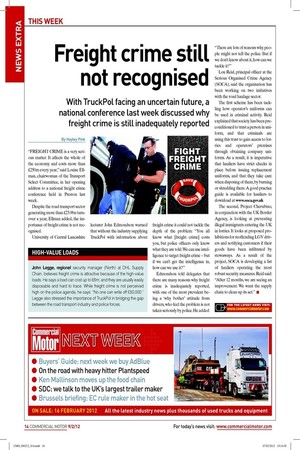Freight crime still not recognised
Page 10

If you've noticed an error in this article please click here to report it so we can fix it.
With TruckPol facing an uncertain future, a national conference last week discussed why freight crime is still inadequately reported
By Hayley Pink “FREIGHT CRIME is a very serious matter. It affects the whole of the economy and costs more than £250m every year,” said Louise Ellman, chairwoman of the Transport Select Committee, in her opening address to a national freight crime conference held in Preston last week.
Despite the road transport sector generating more than £23.9bn turnover a year, Ellman added, the importance of freight crime is not recognised.
University of Central Lancashire lecturer John Edmondson warned that without the industry supplying TruckPol with information about freight crime it could not tackle the depth of the problem: “You all know what [freight crime] costs you, but police oficers only know what they are told. We can use intelligence to target freight crime – but if we can’t get the intelligence in, how can we use it?” Edmondson told delegates that there are many reasons why freight crime is inadequately reported, with one of the most prevalent being a ‘why bother’ attitude from drivers, who feel the problem is not taken seriously by police. He added: “There are lots of reasons why people might not tell the police. But if we don’t know about it, how can we tackle it?” Lou Reid, principal oficer at the Serious Organised Crime Agency (SOCA), said the organisation has been working on two initiatives with the road haulage sector.
The irst scheme has been tackling how operator’s uniforms can be used in criminal activity. Reid explained that society has been preconditioned to trust a person in uniform, and that criminals are using this trust to gain access to lorries and operators’ premises through obtaining company uniforms. As a result, it is imperative that hauliers have strict checks in place before issuing replacement uniforms, and that they take care when disposing of them, by burning or shredding them. A good practice guide is available for hauliers to download at www.soca.gov.uk
The second, Project Cherubino, in conjunction with the UK Border Agency, is looking at preventing illegal immigrants entering the UK in lorries. It looks at proposed prohibitions for reoffending LGV drivers and notifying customers if their goods have been iniltrated by stowaways. As a result of the project, SOCA is developing a list of hauliers operating the most robust security measures. Reid said: “After 12 months, we are seeing an improvement. We want the supply chain to clean up its act.” ■











































